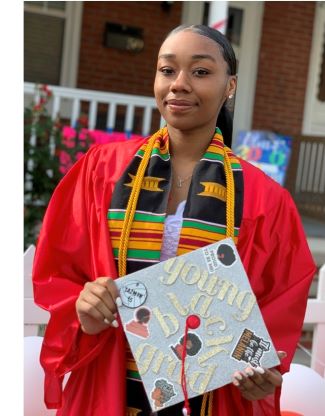
Friday, October 16, 2020
By Yazmyn Stewart
As a young Black girl in America, I grew up ashamed of the way I looked.
I felt uncomfortable with my appearance. Society made it difficult for Black and brown boys and girls to feel included and accepted.
After school every day, I would watch TV for a little bit before I had to start my homework: shows like Hannah Montana, Wizards of Waverly Place and Good Luck Charlie.
I was conditioned by watching white girls on TV with blond or brown hair as the main characters of movies and TV shows. I would play with Malibu Barbies with pale white skin and blond hair with boyfriends that looked exactly like them; they lived in the luxurious pink mansion with an elevator.
Then, I was introduced to TV shows like That’s So Raven and movies like Princess and the Frog. Finally! Characters I could connect with and who looked like me.
It was too late. I already created a sense of what the beauty standard was in America, and my kinky black curly hair and brown eyes and skin weren’t it.
In school, it was just as bad. In second grade, I was the only black kid in my class. That year, we learned about Ellis Island, a place full of hopes and dreams for every immigrant seeking the great American dream. I liked learning about Ellis Island; in fact, I had no problem with it.
The issue arose when it came time for “Ellis Island Day” for the entire second grade. It was the day where every kid would dress up as their ancestor and make their way through a simulation representing what immigrants went through, but in the school auditorium.
A couple of days before Ellis Island Day, my teacher sent everyone home with a sheet of paper. On it the directions read: “please circle the part(s) of the world where your ancestors came from as they traveled to Ellis Island and below please explain the story behind their journey.”
My ancestors never came through Ellis Island because they were the slaves building this country. My African ancestors were ripped from their motherland to come to this country. My Native American ancestors also were invaded by English colonizers; most were wiped out and the remaining were enslaved.
Imagine being a black kid trying to figure out what to do. Even my parents were dumbstruck. All I wrote was “My ancestors were slaves and didn’t come through Ellis Island.” I still had to participate that day. To this day I will never forget that experience.
That little girl, ashamed of her skin, is gone and now stands an older version of herself, proud of her heritage, proud of her accomplishments and proud to look the way she does.
I embrace the challenge of exceeding the presumed expectations of those that would judge me based on the color of my skin. I have grown to be a strong independent Black woman who dreams of making a difference in the world.
This is just the beginning, and my goal is to make sure that all the little Black boys and girls never have to feel the way I once felt.
Yazmyn Stewart, a freshman from Bryn Mawr, Pa., is a member of the Richard A. Henson Honors program taking an honors English 101 class this fall.

